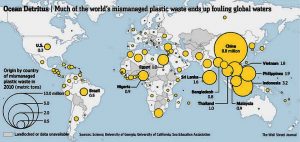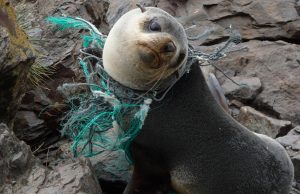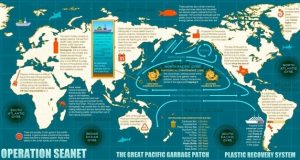Master Watershed Steward Program Monroe County Pennsylvania
January 8, 2018
Penn State Extension and the Monroe County Conservation District are excited to launch the Master Watershed Steward Program.
The Master Watershed Steward program is a collaborative effort between Penn State Extension, Monroe County Conservation District, and local conservation groups. It is similar to the Master Gardener program and is designed to train people in a formal way about the basics of water resource stewardship, creating an energized and educated group of citizens. Currently, the MWS program is in 13 counties across the state and has 194 volunteers that have contributed over 7,500 volunteer hours in 2017.
We are recruiting 20-25 interested people for the class of 2018. The class will consist of 40 hours of training on various topics, including water quality, stream health, groundwater, native plants, and recreational resources. Once this part of the training is complete, trainees perform 50 hours of volunteer service on selected projects such as:
– Organizing and executing stream cleanups.
– Designing and installing demonstration rain gardens.
– Assist in stream restorations.
– Organize educational workshops addressing topics such as rain barrels, pollution prevention, invasive plant control, and stormwater management.
[amazon_link asins=’B01LWOUXH3,0870714988,B01EUD46ZC’ template=’ProductCarousel’ store=’webdespro-20′ marketplace=’US’ link_id=’a994123f-fafe-11e7-b724-b19b0d130fcb’]
Applicants are welcome from all walks of life. If under 18, you must be accompanied by a guardian or adult. The program will start on Thursday, March 1, 2018, 6:00-8:30 pm and will continue every Thursday through May. There will be several Saturday field trips.
An informational session at 6:30 pm will be held on January18 at:
Monroe County Conservation District
8050 Running Valley Rd.
Stroudsburg, Pa.
If interested, please contact:
Jim Vogt
Phone: 570-421-6430
Email: jav45@psu.edu
Web: extension.psu.edu/programs/watershed-stewards/counties/monroe
Penn State Extension
Monroe County
724 Phillips Street, Suite 201
Stroudsburg, PA 18360
Plastics – Stop Littering – We need to make a change !
by S. Oram (new blogger)
Where do you throw your plastics and trash when you are done with it? I would hope you say you RECYCLE ! Because just throwing that container away by mixing it with the normal trash or discarding out the window creates problems. Part of this problem is POLLUTION. This pollution creates visual aesthetic issues, but also damages habitat and threatens the land, air, and sea animals. Did you ever stop and think about how these things can affect the animals outside? Most plastic waste comes from third world countries especially in China, but we can still make a difference.
 https://goo.gl/images/38xfsv Online Source –
https://goo.gl/images/38xfsv Online Source –
In the 1970s, the National Academy of Sciences estimated about 45,000 tons of garbage and waste was being tossed and thrown in the ocean. Since initial estimate, it has gotten even worse. Many people throw things in the ocean and don’t think about the animals in it or the other uses downstream. The materials can get wrapped around the animals or some of the animals eat. The animals become hurt, sick, and die. Littering can kill marine life and destroy habits. Some people don’t stop to think about the animals and their safety. Over 100,000 marine mammals and 1 million sea birds are killed each year from plastic pollution and 6 million tons of debris, i.e., a ton is 200 lbs , enters the ocean each year. It is time to say – Enough!

Sad there is no reason to create this type of pain and suffering.
Did you know it can take up to 450 years for plastic bottles to decompose? This does not appear to be true. “Scientists Thought It Took Thousands of Years for Plastic to Decompose – It May Only Be Decades” and “A more recent study revealed that PET degrades more rapidly than previously thought in ocean water due to the presence of metal ions in the water. Fifty percent degradation was said to occur in 4.5 years and 100% degradation in 72 years.”
Where is most of this plastic? (Operation Seanet)
Here is a list of wastes that go in the ocean and how long it takes to decompose.
Foam cups and tin cans – up to 50 years.
Plastic bottles depending on type and environment could be up to 450 years (Source)
Fine fishing net up to 600 years (much longer for heavier nets).
Cigarette butts- 1 – 5 years.
Plastic bags- 10 – 20 years (Some putting this debris in a plastic bag is not good enough) . The bags breakdown and this it may take 100s of years for the content to decompose.
SO – Simply Bagging the Trash is Not a Solution and Putting the Plastic in a Landfill is the Wrong Choice. We must make every effort to recycle, reuse, and then put our young minds together and help to clean up our oceans, beaches, and landscapes and develop better solutions.
My call to action:
- Please think twice before littering and think twice before throwing stuff away, especially plastic bottles.
- Try Going Bottleless –We tried and we saved money.
- Pick up litter and Recycle – Participate in local clean up events.
- Try to kick the plastic habit.
- Check out Operation – Seanet
other Articles
PFAS Cycle – https://shop.knowyourh2o.com/blogs/news/pfas-and-forever-chemicals-a-new-man-made-cycle-the-pfas-cycle-that-must-be-broken
Plastics and the Environment – Debunking Myths and Responsible Practices
Wildlife and Lead Poisoning – Lead is not Just a Problem for Humans
Sources:
http://www.perseus-net.eu/site/content.php?locale=1&sel=517&artid=565
https://www.dpaw.wa.gov.au/management/marine/marine-parks-wa
http://www.bluebird-electric.net/oceanography/Ocean_Plastic_International_Rescue/Logistics_Recycling_Plastic_Ocean_Cleanup_Cargo_Operations.htm
Keystone Clean Water Team – Groundwater Foundation Library – Links to Educational Webinars – Groundwater Guardians Pennsylvania
“The Groundwater Foundation’s library of FREE educational webinars, available on-demand.”
The Keystone Clean Water Team (KCWT) -Carbon County Groundwater Guardian Program (CCGG) is a 501(c)(3) non-profit, volunteer, environmental education organization which provides homeowners with information on private wells, water quality and quantity, and septic systems. We are dedicated to protecting private well owners from illnesses caused by our drinking water. We advance good groundwater stewardship by raising awareness on a variety of groundwater issues that affects everyone with a private water supply. We can help you get your water tested at the lab of your choice and explain the test results.
[amazon_link asins=’1612121691′ template=’ProductCarousel’ store=’webdespro-20′ marketplace=’US’ link_id=’a7021113-ef1d-11e7-8d97-1fd59a8acfaf’]
Click on the webinar title for a description, presenter information, length, and link to view.
-
Becoming a Groundwater Guardian Green Site: An Overview of the Application Process
-
Introduction to Groundwater Guardian Green Sites
Our Educational Booklet on Groundwater
Looking for a speaker related to Well Issues, Septic Systems, or Groundwater in Pennsylvania – contact: http://www.pacleanwater.org
Supporting Solid Organizations in the Wyoming Valley – Buy a Poinsettia – Kingston Rotary
We always try to help the community, Kingston Rotary is holding a poinsettia sale. There biggest project to date just happened this year, and that is the Forty Fort Park Pavilion. If you are driving down Wyoming Avenue take a look at this structure and the picnic tables etc, that are there. This project cost over $ 50,000, and is completely paid for through grants and our fundraising such as this. Another major project they did over 25 years ago, was the Church Street Park in Kingston. This park was turned over to the borough and is still in use today. They also support many Non profits such as Candy’s Place and WVCA, see Poinsetta order form flyer 2017 and other historic projects in area.
[amazon_link asins=’B0001R050W’ template=’ProductAd’ store=’webdespro-20′ marketplace=’US’ link_id=’61ea1632-ca43-11e7-9fa3-51da19a06d5e’]
We need to replenish our treasury so we can continue to do these projects. These poinsettias are beautiful plants, and are grown by a local grower (BUY LOCAL) , so not only are you helping Rotary you are helping a local business. They make a beautiful holiday decoration for your office. You can email your orders, or just print out the sheet and fax or hand to me then next few weeks, As in the past if you order 10 plants or more I will deliver to your place of business.
Details Contact:
Edward W. Stanks Jr., C.P.A.
458 Wyoming Avenue
Kingston, Pa. 18704
Phone: 570-288-9990
Fax: 570-288-2553
National Pipeline Mapping System – National Gas and other Hazardous Liquids Pipeline
The U.S. Department of Transportation offers the public access to their National Pipeline Mapping System via a free online, interactive map and an iPhone app. It displays general information for pipelines carrying gas and hazardous liquids, liquefied natural gas plants, and breakout tanks within a county-wide zone.
[amazon_link asins=’1507635796′ template=’ProductAd’ store=’webdespro-20′ marketplace=’US’ link_id=’27ce6143-c4de-11e7-bc84-558f4cd9c907′]
While the mapping system is not to be used as a precise identifier of pipelines in a location, the public can access general knowledge about potential sources of contamination in their area. By turning on the visual indicators for accidents and incidents in the area, it’s possible to judge remediation efforts based on past events. Watershed organizations can submit a data request report or find the companies that are operating pipelines in your area. The system is also a useful tool for community outreach and education efforts, whether you’re simply identifying topics for public forums and workshops or looking critically at local remediation efforts.
Featured Training Program
Susquehanna River Basin Commission – Water Withdraws – Fact Sheet Registration.
The Susquehanna River Basin Commission (Commission) is contacting you because you may have clients who are affected by a new program for registration of unapproved water withdrawals and consumptive water uses in the Basin. We are seeking your assistance to help ensure that facility managers are aware of and complete registration by the deadline of December 31, 2019.
An initial contact letter and registration factsheet (GFregistration-grandfathered-water-withdraws-factsheet) was sent to more than 1,300 facilities by direct mail this week. The targeted grandfathered facilities/sources are those where water withdrawals or consumptive uses equal or exceed the regulatory thresholds, but began operating before the applicable regulations became effective. These water withdrawals and uses are generally considered to be exempt from obtaining a Commission docket, provided there has been no environmental harm and no changes are made at the facility.
[amazon_link asins=’0060548312′ template=’ProductAd’ store=’webdespro-20′ marketplace=’US’ link_id=’d8e30f40-c0cc-11e7-a986-b782313bfb61′]
The Commission has initiated the registration effort after reviewing the results of our Cumulative Water Use and Availability Study that highlighted major gaps in the data the Commission needs in order to effectively manage the water resources of the Basin. We estimated that there are possibly more than 700 older, unpermitted facilities with an estimated water use of nearly one billion gallons per day. If accurate, this volume of water use is roughly equal to the total amount currently accounted for, and managed, by the Commission across the entire Basin.
Informational webinars explaining the registration program will be conducted by Commission staff on November 14 and December 13, 2017. To register for a webinar, visit www.srbc.net/grandfathering-registration.
If you need additional information or assistance, visit the website or contact Commission staff at GFregistration@srbc.net.
Thank you,
Susquehanna River Basin Commission
Waste-to-Energy Workshop- Small Scale Digesters and Combined Heat and Power
Featured Link: Training Professionals for the Energy Sector.
Waste-to-Energy Workshop: Improving the Feasibility of Small-Scale Digesters and CHP
This event will take place at West Chester University of Pennsylvania on December 1st, 2017 at 10 am. It will focus on the emerging market of small-scale organic waste-to-energy systems for campuses and facilities, food processors, and breweries, as well as small farms and wastewater treatment plants. The event is free and open to those in related industries or academic studies. A discussion and networking luncheon will follow the seminar.
[amazon_link asins=’0865718342′ template=’ProductAd’ store=’webdespro-20′ marketplace=’US’ link_id=’fb3aad3c-c0cb-11e7-a75c-0fa114da4773′]
Speakers will include Dr. John Pisciotta of the Pisciotta Lab at West Chester University who has developed microbially-based platforms for bioremediation of waste streams into fuels and useful products. Ken Smith of SeaB Energy, which produces modular digesters, and Jill Santos and Dan Sodomsky of Duryea Technologies, a manufacturer of brushless motors and gen sets for biogas applications, will present new commercial technologies for small-scale waste-to-energy.
For additional details, directions and to RSVP, please visit wcuwastetoenergy.eventbrite.com.
Contact:
Julien Sherwood
Event Organizer
Student, Department of Political Science
West Chester University
205 Ruby Jones Hall
50 University Avenue
West Chester, PA 19383
President Trump’s Executive Order designed to change the ACA rules.
This was not added for political reasons but general information as it relates to general health and welfare. We have attempt to keep this site fact based and non-biased on many issues and apolitical. We work with a benefit coordinator in our area and this was the information we got from them.
[amazon_link asins=’B00GMW2NM8′ template=’ProductAd’ store=’webdespro-20′ marketplace=’US’ link_id=’ba611d71-b2b9-11e7-a34e-c77fb90d5435′]
“On Oct. 12, 2017, President Trump signed an executive order affecting the ACA, following Congress’ failure to pass legislation repealing the law. Specifically, the executive order would make changes to certain ACA rules by expanding access to association health plans, health reimbursement arrangements (HRAs) and short-term, limited-duration insurance.
The executive order does not, itself, make any specific changes to existing regulations. Instead, it directs federal agencies to issue new regulations or guidance to implement the order’s policies. As a result, it is difficult to know how any existing ACA regulations will be specifically impacted before any further guidance is issued.
In any case, the immediate impact of the executive order will likely be small, since it will take time to implement policies, regulations and other guidance to carry out these changes. Therefore, employers should continue to prepare for upcoming requirements and deadlines to ensure full compliance.
It is our goal to guide you through this ongoing change. If you have any questions regarding this topic, please contact Creative Benefits, Inc. at 610.325.0200.”
Kind Regards,
Your Creative Benefits Team
Creative Benefits, Inc.
3809 West Chester Pike, Suite 190
Newtown Square, PA 19073
610-325-0200
http://www.creativebenefitsinc.com
Please support this portal
[amazon_link asins=’0071592083′ template=’ProductCarousel’ store=’webdespro-20′ marketplace=’US’ link_id=’90586c78-b2b8-11e7-830d-6d61a1e33f6e’]
Your Drinking Water and Your Health – You are Not an Observer !
Even though 60% of the human body is water, water is a resource that is often taken for granted. The primary concerns with water relate to having adequate quantity of the proper quality. In terms of hydration, drinking water is probably one of the best ways to keep your body healthy. Water is used in your body to help maintain your temperature and ensures the proper operation of your circulatory, digestive, and neurological systems. Water is one of the pathways that potential contaminants and disease causing agents can enter the body, so the quality is also important. Therefore, we need drinking water of adequate quantity of the proper quality.
When the body is not properly hydrated, our body’s response is to make us feel thirsty, but if you miss this clue watch out for dry mouth, swollen tongue, weakness, dizziness, confusion, palpitations, and fainting. If over hydrated, you can become water intoxicated or hyperhydration. If hyperhydration occurs, the kidneys can not process all the water and the system becomes overwhelmed. There are phone apps and other tools to help you to remember to drink enough water, but our general recommendation is if you feel thirsty it is time to get a drink and given a choice pick water.
Water comes in many forms, which can include premium bottled water, tap water, spring water, carbonated water, soda, coffee, tap water, nutrient infused water, juices, and purified water. Of all these, it is my professional opinion that we just need to drink water. The two most common sources of drinking water for a community is either public water or a private water source. A public water source is always regulated by both the federal and state governments and many may call this city water or tapwater, but well or spring water may be from a public or private source. If you get your water directly from a well or spring, this is a private source and this is not commonly regulated.
If you get your water from city water, the most common health concerns are related to the presence of chlorine-by-products or corrosive by-product in the United States, the public water supply systems are disinfected using various forms of chlorine and phosphate is added to attempt to control corrosion. The chlorine is used to disinfect the water, but it can react with naturally occurring organics to form trihalomethanes, i.e., a potential carcinogen; while phosphate will react with the metals in the water to form a scale or coating on the inside of the piping, see “Flint, Michigan”. If you are on well water, the most common problems are the presence of bacteria and elevated levels of salts in the water, like nitrate, chloride, and sulfate, or corrosive water. In some cases, the water may contain elevated levels of radionuclides and trace metals, like arsenic, iron, lead, and manganese. The quality of the drinking water depends on type of water, location, level of treatment, the condition of your plumbing, and your home or house. In some areas, the community is concerned about pipelines and natural gas development, but a hidden problem may be the existing quality of their drinking water.
For citizens, our general recommendations related to drinking water are:
1. City Water Customers– Review any annual “Consumer Confident Reports” produced by your water supplier and act accordingly.
2. Private Water Sources -Get your water tested, at least annually, and have the results review by an expert (our Mail order program) or maybe conduct a in-home screening test yourself and calculate your Water Quality Rank.
3. Look out for potential problems with your drinking water, based on what you can see, taste, smell, or otherwise detect with your senses or problems that may be caused by the water.
4. Review our Drinking Water Diagnostic Web Application.
A few short phrases we should try to remember.
We ALL Live Downstream !
Groundwater and Surface water are Connected!
We are Part of the Water Cycle – Not just an Observer!
Websites of Interest
Consumer Confidence Reports
https://www.epa.gov/ccr/ccr-information-consumers
Neighborhood Hazardous Reports and Water Testing
http://www.knowyourh2o.com

